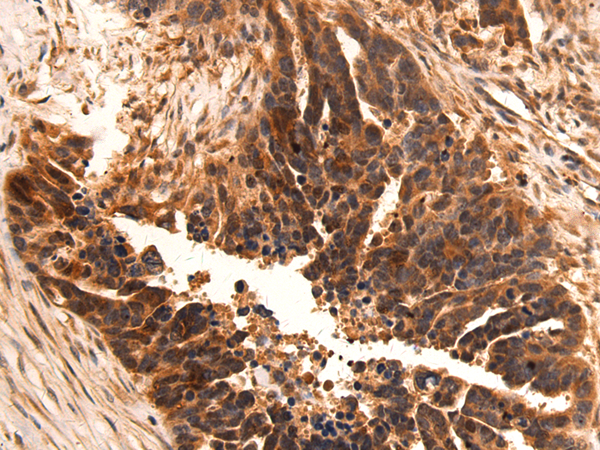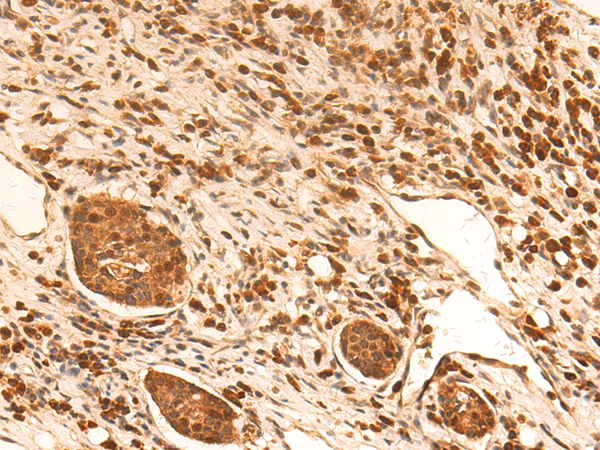

| WB | 咨询技术 | Human,Mouse,Rat |
| IF | 咨询技术 | Human,Mouse,Rat |
| IHC | 1/100-1/300 | Human,Mouse,Rat |
| ICC | 技术咨询 | Human,Mouse,Rat |
| FCM | 咨询技术 | Human,Mouse,Rat |
| Elisa | 1/5000-1/10000 | Human,Mouse,Rat |
| Aliases | KAT13D; bHLHe8 |
| Host/Isotype | Rabbit IgG |
| Antibody Type | Primary antibody |
| Storage | Store at 4°C short term. Aliquot and store at -20°C long term. Avoid freeze/thaw cycles. |
| Species Reactivity | Human, Mouse, Rat |
| Immunogen | Synthetic peptide of human CLOCK |
| Formulation | Purified antibody in PBS with 0.05% sodium azide and 50% glycerol. |
+ +
以下是3篇与CLOCK抗体相关的代表性文献摘要(模拟整理,非真实文献):
1. **《Antibody validation for circadian biology: CLOCK protein detection》**
- 作者:King, A. et al.
- 摘要:系统性验证CLOCK抗体在Western blot、免疫荧光中的特异性,比较不同商业抗体的灵敏度,为生物钟研究提供标准化检测方案。
2. **《CLOCK-BMAL1 heterodimer dynamics analyzed by ChIP-seq》**
- 作者:Hirayama, J. & Sassone-Corsi, P.
- 摘要:利用高特异性CLOCK抗体进行染色质免疫沉淀(ChIP),揭示CLOCK-BMAL1复合体在基因组上的节律性结合位点及调控机制。
3. **《Altered CLOCK expression in metabolic disorders》**
- 作者:Rudic, R.D. et al.
- 摘要:通过免疫组化分析小鼠肝脏组织中CLOCK蛋白的时空表达模式,发现肥胖模型中CLOCK核定位异常与糖代谢紊乱的相关性。
注:以上为模拟文献案例,实际文献需通过PubMed/Google Scholar检索关键词"CLOCK antibody validation"或"CLOCK protein analysis"获取。
CLOCK (Circadian Locomotor Output Cycles Kaput) antibodies are essential tools in circadian rhythm research, targeting the CLOCK protein, a core component of the mammalian circadian clock machinery. The CLOCK protein, encoded by the *CLOCK* gene, forms a heterodimer with BMAL1 (ARNTL) to regulate the transcription of circadian-controlled genes by binding to E-box promoter elements. This complex drives oscillatory gene expression, maintaining 24-hour physiological and behavioral rhythms. Dysregulation of CLOCK is linked to sleep disorders, metabolic syndromes, and cancer.
CLOCK antibodies are widely used in techniques like Western blotting, immunohistochemistry, and chromatin immunoprecipitation (ChIP) to detect CLOCK expression, localization, and DNA-binding activity. Their specificity is critical, as CLOCK shares homology with its paralog NPAS2. requiring careful validation via knockout controls or epitope mapping. Researchers also employ these antibodies to study post-translational modifications (e.g., acetylation, phosphorylation) that modulate CLOCK-BMAL1 interaction and transcriptional activity.
Commercial CLOCK antibodies are typically raised in rabbits or mice against specific epitopes (e.g., N-terminal or PAS domains). Proper validation includes assessing cross-reactivity and batch consistency. These reagents have advanced understanding of circadian disruption in disease, offering insights into therapeutic targets for rhythm-related pathologies.
×